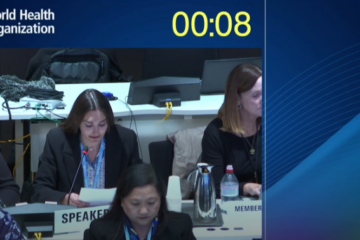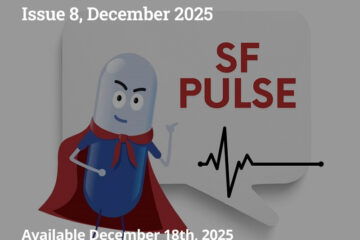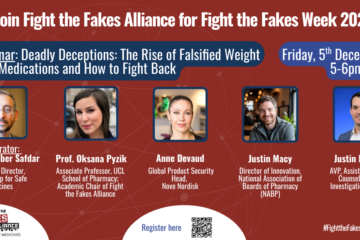Miriam Haendler, student at the UCL School of Pharmacy, was the deserved winner of the photo contest held during the UCL Fight the Fakes & Commonwealth Pharmacists Association event on the Global Impact of Substandard and Falsified Medicines in London. Participants shared a photo to best capture the global health threat caused by fake medicines. Here’s the winning photo, chosen by our jury.
Growing up in Germany, Miriam moved to London for her studies where she is currently completing her second year. She enjoys the interdisciplinary nature of her programme, gaining in-depth knowledge of chemistry, biology and pharmacology, but also getting insights into professional and legal aspects of pharmacy. In her spare time, she’s leading UCL’s women’s football team as the captain, which allows her to balance academics with sports and is a great way of socializing with other students. Fight the Fakes had the chance to talk to Miriam about her experiences with falsified and substandard medicines and how she sees the fight against fake medicines going forward.
Fight the Fakes: Miriam, when was the first time you heard about falsified and substandard medicines? What were your initial thoughts about the scope and relevance of the issue?
Miriam Haendler: I don’t remember the first time I heard about falsified medicines. I think, like most people, I realised that falsified medicines existed. However, I did not know about the scope of the problem and never felt like I was or would be affected by this. I gave this topic more thought when I went to China during my year abroad. I was unsure whether I could trust medicines that I didn’t bring from home and wondered why I felt this way and if my doubts were justified. Doing further research, I quickly realised that falsified medicines were a huge global problem and affected every part of the world, not only developing countries.
I then gained an in-depth insight into the issue as part of my university programme. We learnt about the extent and severity of this problem and what methods were in place to help tackle it. The student-initiative UCL Fight the Fakes also helped me understand this topic by sharing knowledge and raising awareness about falsified medicines.
Fight the Fakes: How do your studies relate to falsified medicines?
Miriam: In my opinion, studying Pharmacy goes hand in hand with knowing about the issues around falsified medicines. Pharmacists are the experts of medicines and the contact point between the patient and their medication. So pharmacists are in an ideal position to raise awareness about the dangers of fake meds and do all they can to fight this public health threat.
It is important to consider that no matter how much research and resources go into developing a new medicine, no matter how effective the medicine could be and no matter how well a healthcare professional counsels a patient, if the patient ends up taking falsified medicines, all these are wasted efforts. Fighting fake medicines should concern everyone, including researchers, manufacturers, healthcare professionals and the wider population.
Fight the Fakes: What do you think is most striking about falsified medicines?
Miriam: It’s probably the big discrepancy between the public perception and the actual scope of this issue. Many people are aware that falsified or substandard medicines do exist, but very few are aware of the huge amounts of counterfeits that are currently circulating and may not realise that they could be affected by this issue, too.
Fight the Fakes: What is the best way to stop fake medicines reaching patients?
Miriam: The issue needs to be tackled at several levels. Part of the issue can be solved through tracking systems and tamper-evident packaging, which could prevent falsified medicines from reaching patients. In addition, the issue should be tackled at an earlier stage by tracking and closing down the manufacturing of fake medicines, for which blockchain technology could be very helpful.
But it is almost impossible to prevent all falsified medicines from reaching the patient. Therefore, patient awareness and involvement is crucial. Some countries have already introduced verification systems that enable patients to check if the medicine is genuine through their mobile phone. Only by acting across the whole supply chain can we significantly decrease the risk of falsified medicines.
Fight the Fakes: What can patients themselves do to protect against fake medicines?
Miriam: Only purchase medicines from trusted sources. This may seem obvious, especially with prescription medicines. But it is important to remember that there are many seemingly ‘harmless’ medicines that can be purchased over-the-counter that could be falsified.
In low and middle-income countries, it may be difficult to differentiate between trustworthy pharmacies and ones that sell fake medicines. In this case, I would advise patients to use the testing and tracking methods available to them. To benefit from the measures, patients need to be informed and educated on how to use these methods adequately and know what to look out for.
In high-income countries, I would focus my attention on internet pharmacies, which are safe if the patient knows what to look for. For instance, the EU has introduced a common logo displayed on registered pharmacy sites that allow the patient to verify if the website is legit. This simple method can significantly reduce the amounts of fake medicines purchased.
Fight the Fakes: What should you do if you find out that you had taken falsified medicines as part of your treatment?
Miriam: First, probably see a healthcare professional you trust and ask for advice and tests to check if the fake medicine contained harmful substances. Secondly, think back to where the medicine was purchased and then contact the person in charge, seek advice from an external body and ask for further security measures. I would also reflect on my own behaviour and evaluate how to avoid taking falsified medicines in the future. Finally, raise awareness and share what happened to prevent the same thing from happening to someone else.
Fight the Fakes: Will you continue to fight falsified medicines?
Miriam: I will continue to fight falsified medicines, mostly through spreading knowledge and awareness. There are many ways that can help reduce the production and trade of falsified medicines but there will always be measures taken to bypass control and checking systems. So having an informed patient population will always be of primary importance. I see pharmacy students such as myself in a responsibility to help share our knowledge and raise awareness to contribute to the fight of this big global issue.
Fight the Fakes: Thank you very much for taking the time to speak to us and congratulations on winning the competition.
Find out more about UCL Fight the Fakes and make sure to follow us on Twitter and Facebook. Join the conversation and speak up using #fakemeds.
Director of @UCL@School_Pharmacy Duncan Craig announces winner of the @UCLFightsFakes Photography Competition Miriam Haendler ?????? #UCLFakeMedsPanelpic.twitter.com/eooFbJaO0h
— Oksana Pyzik (@OksanaPyzikUCL) 17 March 2018


